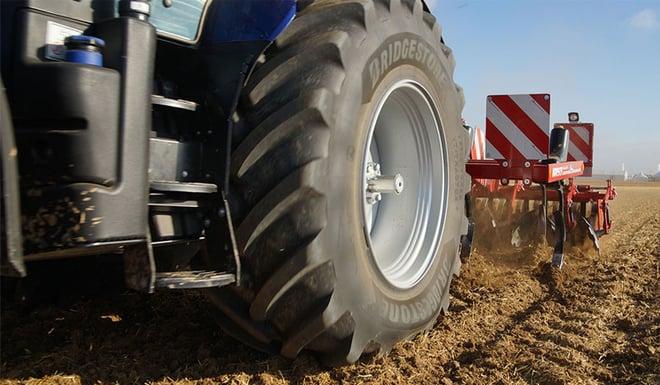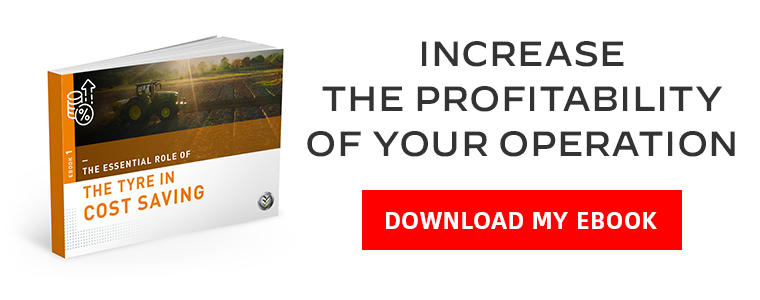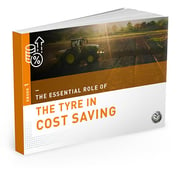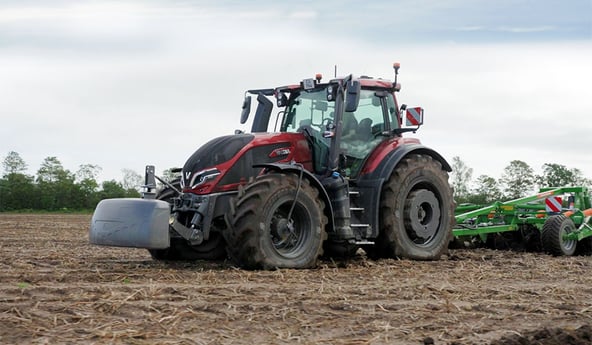If you have to change your tractor tyres, you will be faced with the problem of choice. There are so many options and different brands available that this choice is often a real headache.
You may well tell yourself that the simplest thing to do is to take the same tyres as last time, to make your life easy.
However, you now have a real opportunity to improve your tractor’s capacities. This choice can have a direct impact on your productivity, improve your profitability, in particular by opting for high-tech, low-pressure tyres, whose advantages are presented below:
What are the characteristics of a low-pressure tyre?
Low pressure tyres generally bear the label VF Very high Flexion Tire or IF Increased Flexion. They are characterised by their very high flexion and deflection capacity.
Their casing has a much greater deflection capacity than a standard tyre. They can therefore be used without risk of deterioration at a pressure of 0.8 bar in the fields, whereas a standard tyre can only be driven from 1.2 bar upwards.
As the size of a VF tyre is generally bigger than classical tyres, the positive consequences on the compaction of your soil and on your productivity will be considerable.
Depending on the reference, they are approved for speeds of up to 70 km/h.
1. They offer a greater load capacity
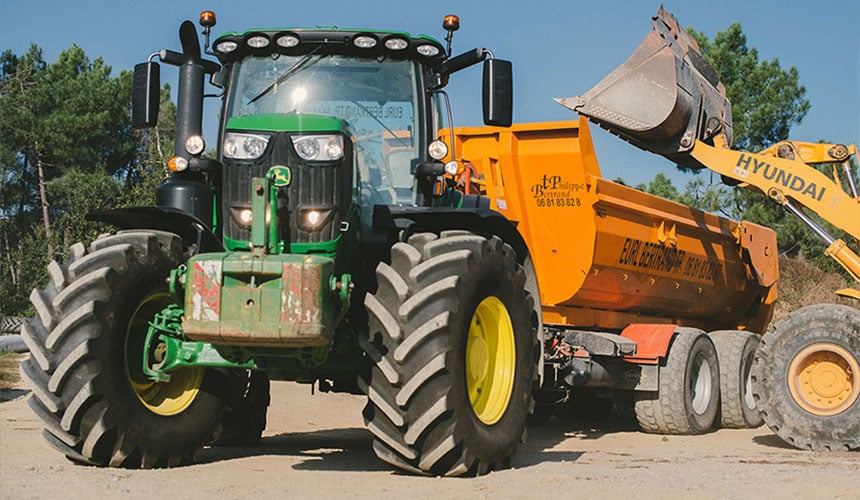
Low-pressure tyres have a greater load capacity.
For the same size wheel, these high-tech models can bear up to 40% more weight. This advantage is particularly useful during the harvest when pulling heavy trailers.
Thanks to their reinforced structure, low-pressure tyres allow normal driving speed so you will save time when going from field to storage area and back.
2. Low-pressure tractor tyres preserve your soils
The repeated passage of tractor wheels and different agricultural machinery over your land compacts the soil to a certain extent.
Standard tyres at normal inflation pressure exercise the greatest pressure over a small surface area. This results in compaction which makes germination more difficult as well as the growth of the root system of the seedlings.
With low-pressure tyres, the weight to the ground is distributed over a larger contact patch so that the weight of the tractor or trailer is spread out better. During the tilling period, the soil is easier to work; there are therefore less ruts and there is less need to turn to decompaction techniques.
Spring crops are particularly concerned by the risk of soil compaction due to weather conditions. Soil that often has a high water content is effectively more sensitive to pressure.
3. Fuel savings are made thanks to lack of slippage
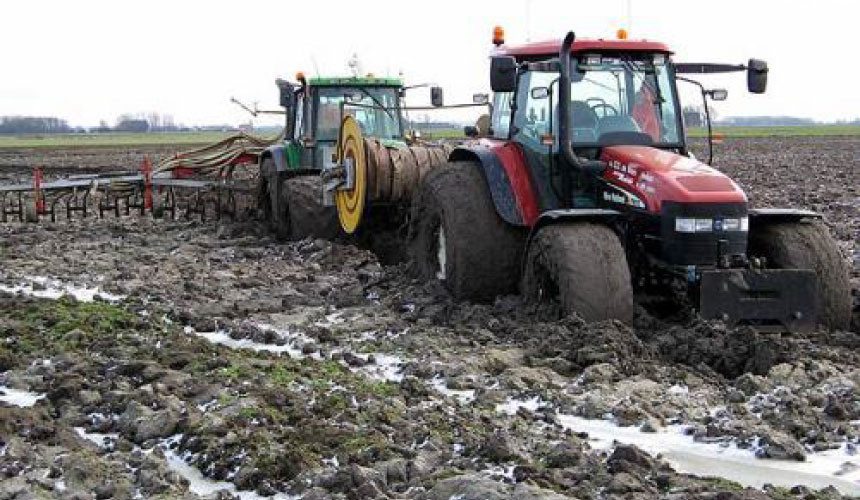 Numerous farmers have experienced regular tractor tyre slippage on wet soils. This makes it necessary to develop more power to complete the same work, leading to excess fuel consumption which, in the long run, weighs heavily on the farm’s operating budget.
Numerous farmers have experienced regular tractor tyre slippage on wet soils. This makes it necessary to develop more power to complete the same work, leading to excess fuel consumption which, in the long run, weighs heavily on the farm’s operating budget.
With low-pressure tyres, slippage decreases considerably and may even disappear totally thanks to an increase in the contact patch. The lugs find more grip and all the engine power is therefore transmitted to the ground.
Over the tyre’s lifespan, the savings made can reach 35 litres per 50 hectares farmed. Even better, since the ground is not hardened, as it has not been compacted, deep soil tilling is not necessary in order to obtain the same yield, which makes it possible to use even less fuel.
4. You save time on tyre pressure adjustments
When using standard tyres, you need to adjust tyre pressure between the fields and the road. On agricultural surfaces the inflation pressure must be minimal to avoid the risk of slippage. However, on the road, tyre pressure that is too low may damage the tyre casing considerably. Therefore, it is necessary to increase pressure to avoid rolling resistance.
VF tyre users do not face this specific disadvantage, which leads to considerable loss of time at the beginning or end of the day or each time you change field. The design of these new technological tyres makes it possible to keep the same pressure, whatever the type of land or use of the tractor. This time saving has positive repercussions on the workload.
5. Better traction
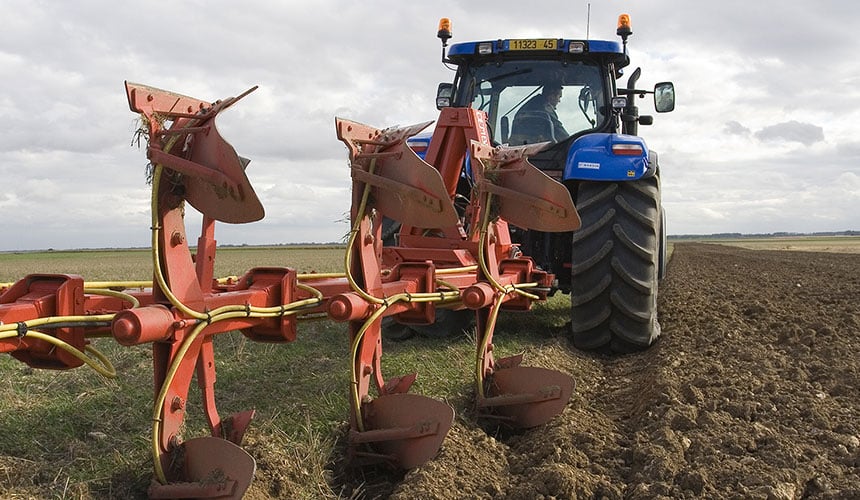
In order to improve yields, we tend to look exclusively towards greater engine power by buying a bigger tractor, yet this radical solution with major economic implications may be avoided, by simply adopting the solution of equipping your current tractor with large, low-pressure VF tyres.
These tyres, which are the result of research and development work, have a more sophisticated lug design with angles, size and thickness perfectly optimised for the best possible soil penetration, multiplying the tyres’ capacity to transmit tractive force horizontally, pulling your trailer better with minimum slippage.
This structure has been studied and tested to obtain maximum self-cleaning, even on heavy soils during spring sowing.
6. Greater tractor safety
We all know that your tractor’s main vocation is not for transport but to work the ground at reduced speed, although certain farmers are obliged to spend a lot of time on the road due to the distance between fields.
The power of the machines and the quality of the roads makes it possible to drive at the maximum authorised speed with a feeling of total safety and it is often here that the main difference between a standard set of tyres and large, low-pressure VF tyres can be felt. Unladen braking distances on the road in dry conditions are generally similar, whatever the tyre model, but when loaded, with a full implement or trailer, the VF tyre will allow you to reduce the braking distance by several meters.
The tyre has been designed to squash into itself without causing any damage. Its reinforced sidewalls make it possible to cushion the mass and speed in a controlled way by increasing the contact patch between ground and tyre and therefore spreading the braking force more evenly. This allows you to absorb the mass of your trailer completely while staying in line.
7. more comfort for those with back problems
In addition to immediate safety, the flexibility of the sidewalls ensures a major improvement in driver comfort, reducing the vibrations considerably compared to standard tyres and minimising back ache for those who suffer from lumbago or herniated discs.
The Bridgestone-agriculture.eu blog is written and administered by tractor tyre experts who are available to provide you with the advice that you need about your farming tyres. They will help you to maximise your productivity with information on all things relating to tyres: inexpensive tractor tyres - technical data for farming tyres - advice on farming tyre pressure - solution to avoid soil compaction - sprayer tyre pressure - Why and how to ballast your tractor tyres - when to use twin wheels - the mechanical causes of abnormal wear - cheap agricultural tyres - etc...
To take it a step further and increase the profitability of your farm, the tractor tyre experts has prepared a free, highly detailed, ebook which explains the essential role of farming tyres on your productivity..
Most people who read this article have also read some of the following articles:
This information is intended only to make you aware of the technical and functional aspects of agricultural tires and their use. It does not allow you to make a judgment or a definitive conclusion on a given problem. Only your agricultural tire expert is able to make a technical assessment and take a final decision, case by case.
Leave a
commentary
Your email address will not be published.
Required fields are indicated with *


